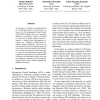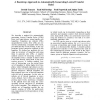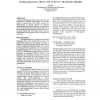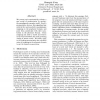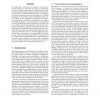EMNLP
2009
13 years 2 months ago
2009
Polarity lexicons have been a valuable resource for sentiment analysis and opinion mining. There are a number of such lexical resources available, but it is often suboptimal to us...
NAACL
2010
13 years 2 months ago
2010
In this paper, we describe an approach based on off-the-shelf parsers and semantic resources for the Recognizing Textual Entailment (RTE) challenge that can be generally applied t...
EMNLP
2010
13 years 2 months ago
2010
We describe a model for the lexical analysis of Arabic text, using the lists of alternatives supplied by a broad-coverage morphological analyzer, SAMA, which include stable lemma ...
CORR
1999
Springer
13 years 4 months ago
1999
Springer
We describe a method for automatically generating Lexical Transfer Rules (LTRs) from word equivalences using transfer rule templates. Templates are skeletal LTRs, unspecified for ...
COLING
1994
13 years 5 months ago
1994
A theoryof interlanguage(IL)lexiconsis outlined,with emphasis on IL lexical entries, based on the HPSG notion of lexical sign. This theory accounts for idiosyncratic or lexical tr...
COLING
1996
13 years 5 months ago
1996
The focus of this article is the integration of two different perspectives on lexical semantics: Discourse Representation Theory's (DRT) inferentially motivated approach and ...
ACL
1997
13 years 5 months ago
1997
We present and experimentally evaluate a new model of pronunciation by analogy: the paradigmatic cascades model. Given a pronunciation lexicon, this algorithm first extracts the m...
ACL
1997
13 years 5 months ago
1997
Verbal and compositional lexical aspect provide the underlying temporal structure of events. Knowledge of lexical aspect, e.g., (a)telicity, is therefore required for interpreting...
COLING
2000
13 years 5 months ago
2000
We argue that in general, the analysis of lexical cohesion factors in a document can drive a summarizer, as well as enable other content characterization tasks. More narrowly, thi...
ACL
1998
13 years 5 months ago
1998
The lexical acquisition system presented in this paper incrementallyupdates linguisticproperties of unknown words inferred from their surrounding context by parsing sentences with...

